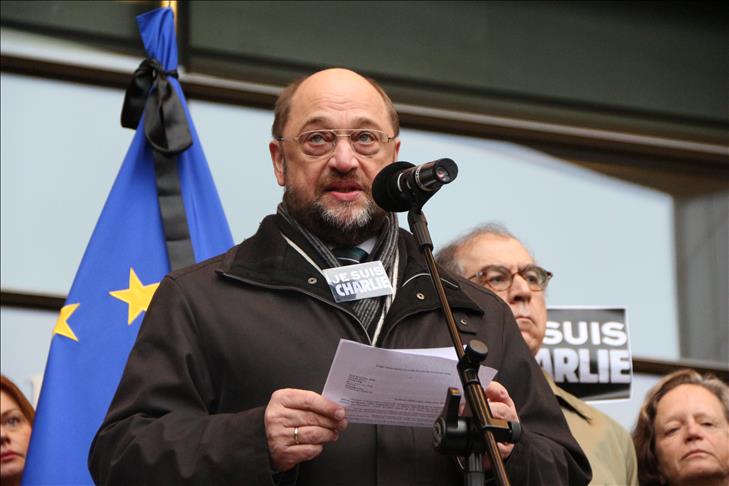
By Ilgin Karlidag
BRUSSELS
The debate over freedom of speech sparked by the massacre at the Paris office of satirical magazine Charlie Hebdo has intensified, with pundits and politicians pointing out its graphic ridiculing of religion and politics is banned in many countries.
European Parliament President Martin Schulz said during a speech in Strasbourg: ''We must not minimize our freedom of thought or revise downward our European values in the face of violence and Kalashnikovs.
''We, as Europeans, must defend them, just like the millions of French who walked through Paris and through France in dignity, supported by thousands of citizens around the world."
But Israeli Cartoonist Ido Amin wrote in an opinion article for Haaretz: "In Israel, Charlie Hebdo would not have even have had the right to exist."
''In France, freedom of speech is considered a universal right, while in Israel such a weekly would not be able to exist because of the Israeli law which bans offending religious sensibilities.''
Curbs on satire
Amin said the law in Israel prohibits illustrating Moses, Jesus or Muhammad in a way that would hurt the feelings of believers.
And Padraig Reidy, Editorial Director of 89up, a consultancy focused on civil liberties, said in a traditionally Catholic nation such as Ireland, which adopted a defamation law in 2009, a prosecution against a publication which satirizes religion could be brought.
Reidy said: ''Given the wording of the law, which is quite vague, and relies on the idea of a publication causing 'outrage among a substantial number of the adherents of [a] religion', then it is entirely possible that a prosecution against publication of graphic satirization of religions could be brought, though the law would not extend to banning an entire publication."
According to Ireland’s defamation law, blasphemy can be punished with a fine of up to €25,000 (around $30,000).
Around 64 percent of respondents to an online poll released by internet news publication thejournal.ie in Ireland on Monday said there should be a referendum on Ireland’s blasphemy law.
'Aggressive discrimination'
In Australia, the Racial Discrimination Act makes it unlawful to "offend, insult, humiliate or intimidate" another person or group of people because of their "race, color or national or ethnic origin".
According to the European Court of Human Rights, some forms of expression are considered offensive and contrary to the European Conventions on Human Rights, including racism, xenophobia, anti-Semitism, aggressive nationalism and discrimination against minorities and immigrants.
The European Court of Human Rights states on hate speech: "Tolerance and respect for the equal dignity of all human beings constitute the foundations of a democratic, pluralistic society."
''That being so, as a matter of principle it may be considered necessary in certain democratic societies to sanction or even prevent all forms of expression which spread, incite, promote or justify hatred based on intolerance."
Anadolu Agency website contains only a portion of the news stories offered to subscribers in the AA News Broadcasting System (HAS), and in summarized form. Please contact us for subscription options.


